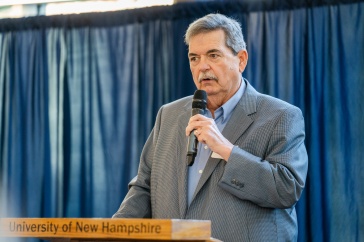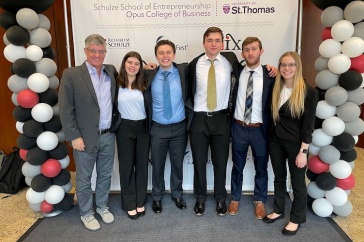
Assistant professor of strategic management Jianhong Chen studies corporate leadership
A CEO not only sets the tone of an organization but also the “pace,” a work style with far-reaching implications for corporate success. So demonstrates Paul College’s Jianhong Chen, assistant professor of strategic management, in her influential study of “urgency and pacing” or “temporal personality” among hundreds of corporate leaders.
“Your urgency dictates how pressed you feel in your day to day work,” Chen said. “Your pacing style dictates whether you insist on getting things done right away, prefer to procrastinate, or tend to do things methodically over time.”
In one study, Chen’s research found that organizations led by CEOs with a pressing sense of urgency, tempered by a preference for working at a steady and methodical pace, enjoy greater success with innovation.
In another study, Chen looked at the relationship between CEOs’ perception of past, present and future, and companies’ rates of new product introduction. Based on a longitudinal study of 221 companies in 19 industries, Chen showed that in stable industries where technology developments and customer demands do not change very rapidly (e.g. food industry, construction equipment industry), firms with CEOs who focus more on the past and present introduce products faster; conversely, in dynamic industries (e.g., electronic equipment industry, computer industry), firms with CEOs who focus more on the future introduce products faster.
Chen was recipient in the summer of 2016 of the Sumantra Ghoshal award for the research paper that advances research while deriving important implications for practice. This was awarded by the strategic management division of the Academy of Management.
“Accelerated changes in competition, technological advances and customer preferences have forced firms to think harder about time management,” said Chen. “A leader’s temporal personality molds expectations and evaluation, and shapes decision making throughout the organization.”
Chen’s research has far-reaching implications for corporate strategy as firms seek to appoint the right CEOs for their cultures.
“Our findings offer new evidence that the CEO plays an outsized role in a firm’s success,” Chen said.
In addition, an effective CEO must be able to sync up his or her leadership team’s disparate temporal styles if the organization is to be successful.
“Diversity of temporal style can be strength—it’s good to have some who think long term and others who think short term—but only if the CEO can make them work together and balance out,” Chen said. “Otherwise, you’re going to have a hard time competing.”
-
Written By:
Dave Moore | Freelance Writer




















































